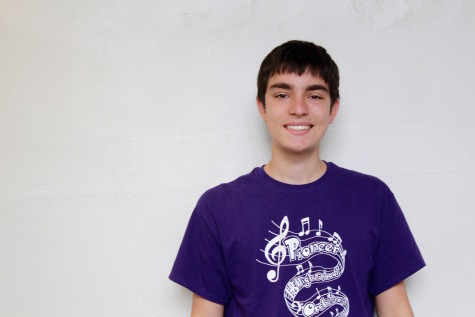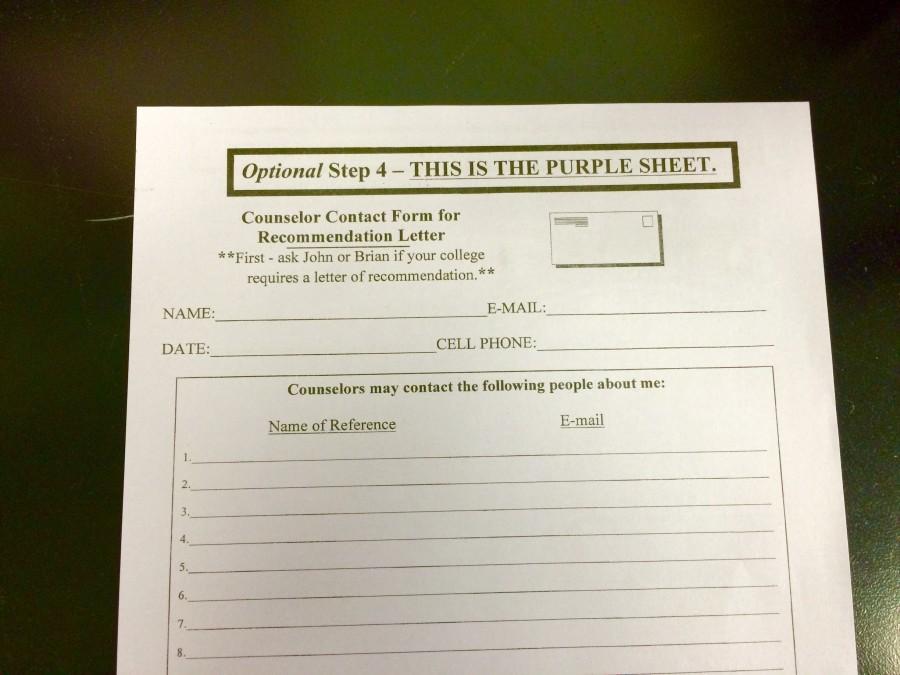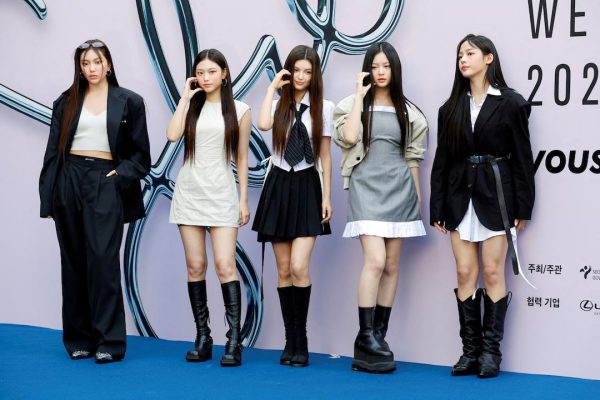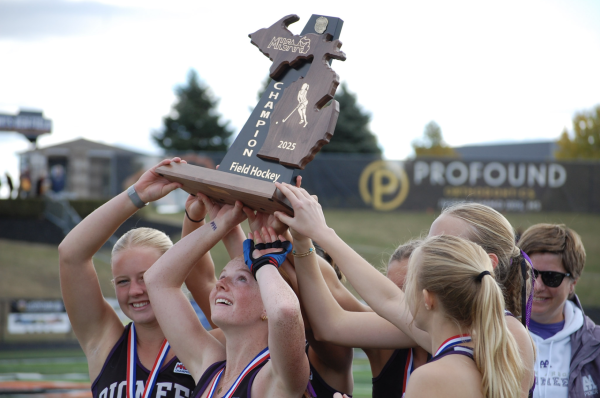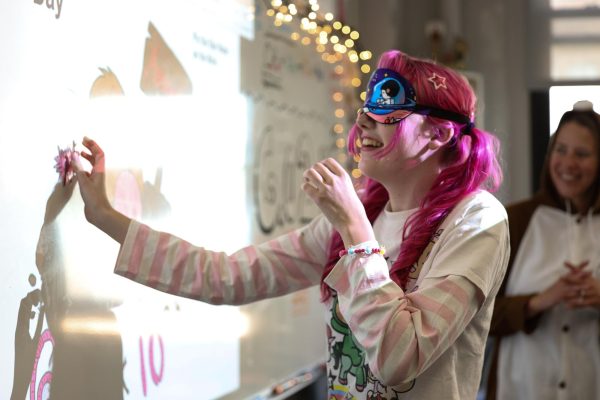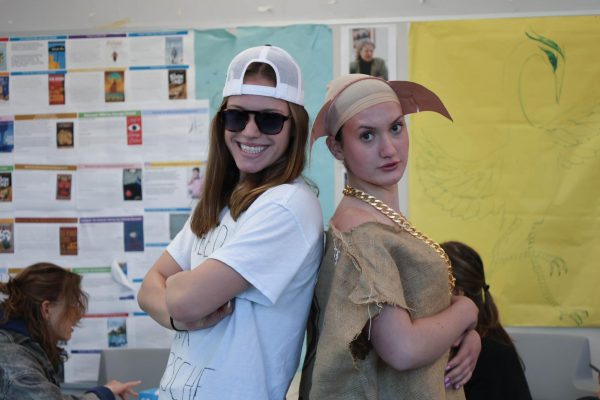Senior Meeting 2015
The famed “purple sheet” asks students to list about fifteen people they know well. The counselors contact these people to supply information about the students.
When the Community High School class of 2016 walked into Craft Theatre for their senior meeting, they were met with two dozen sheets and packets neatly stacked on an array of tables. By the time they left for sixth hour, the meeting had armed them with more than just paperwork. The seniors exited with specific information about the college application process, and several new jokes courtesy of CHS Counselor John Boshoven.
In the span of 45 minutes, Boshoven covered the essentials of applying to college, from necessary hard statistics to the nuances of conversing with admissions officers. He also explained the process of asking for letters of recommendation and gave tips on navigating the Common Application.
CHS senior Meghan Napolitan found the meeting helpful in articulating the application process. “I was really confused beforehand about what to do,” Napolitan said. She feels that the meeting helped her make sense of her obligations.
Still, while the meeting alleviated stress for some, other seniors, like Mohan Ritsema, feel the anxiety mounting. “As the deadlines approach, I feel like I’m running out of time,” Ritsema said. “There’s a big buildup to this big moment where I get into college. It’s pretty stressful.”
Even though the Common Application has added uniformity to applications, not all seniors are experiencing the same process. Some schools that do not use the Common App require different methods of uploading transcripts. Certain colleges assign extra essays, while others do not take any essays at all. One student, according to Boshoven, has already finished the entire college search. “We have a senior who’s already been admitted to their first choice college,” Boshoven said. “He’s already out.”
Natsume Ono, who is applying to a school that does not use the Common App, must use parchment.com to submit her transcript to this school. While she too found the meeting useful, some of her questions remain unanswered. “They didn’t talk about Parchment at all in the meeting, and I wish they had gone over that, because it was just about Common App,” Ono said.
Boshoven acknowledged the frustration of juggling the different requirements of each college. “You’ll notice these colleges are not working together,” Boshoven said. “They’re all in it for themselves. College A might want all scores, College B might want your best scores and College C might not want scores. It’s all going to be different. They make up the rules.”
College applications require work on the part of staff as well as of students. Most students need a letter of recommendation from two of their teachers. Boshoven suggested that students find a nice way to repay these teachers. “Bring Judith a can of Diet Coke — you know she loves those,” he said. “Bring Ken a gift certificate to Zingerman’s Coffee. You now he drinks tons of it every day. You know your teachers. Bring them something really sweet that’s nice.”
Students must obtain not only letters of recommendation from teachers, but also a letter from a guidance counselor. The CHS counselors take a unique approach to their letters.
“Brian [Williams, CHS counselor] and I like to write letters differently than most high schools do,” Boshoven said. Instead of describing student achievements evident on a transcript, Boshoven and Williams interview figures in the student’s life, giving them a more personal and complete image of the student.
“We like to talk about who you are and not what it is you do. We like to talk to people who know you really well,” Boshoven said. “That’s why we interview 15 to 20 people for every letter. You won’t find many high schools that do that, but we’re geeks about that. We think it’s important.”
Boshoven also invited Alex Halladay, the Michigan representative for the University of Chicago, to speak. Halladay, a native Michigander who visited CHS on the day of the senior meeting, gave advice on how to be a successful college applicant.
“We see it as a proposal,” Halladay said. “You are not going to propose to just anyone walking down the street. Just because they’re pretty is not a good enough reason to propose to them. And it’s the same way with colleges. Just because it’s a pretty campus doesn’t mean it’s the best place for you.”
Halladay emphasized that the worst case scenario for a student and a college is if the college accepts the student, only for the student to discover the college was a terrible fit. “Make sure that when you’re looking for colleges, you’re thinking, is this a good fit for you?” Halladay said. “What makes this a good fit for you? Why do you like it?”
After learning from Boshoven and Halladay and being fully immersed in college applications, some of the seniors have advice for underclassmen about a process that they wish they had known more about at a younger age.
Ono recommends considering what might make good essay material early on. “Thinking a little bit about what makes me unique throughout those years would have been really helpful now that I’m writing my essays,” she said. She suggests not shaping experiences for the sake of essays, but keeping in mind which experiences are especially intriguing.
Ritsema believes that college visits have been particularly helpful for him. “It gives me a really good feel for what the college is like,” Ritsema said. “I think that’s a really big part of what you look for in a college — the general atmosphere. And there’s no better way to figure that out than a tour.”
Boshoven reminded students that he and Williams are always available to dole more advice of their own and answer any questions. If they feel so inclined, he added, they can always repay the counselors with chocolate, coffee, or sports cars.
